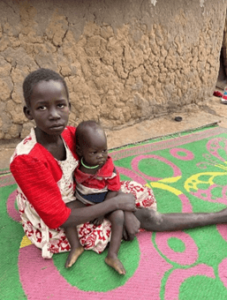The little girl pictured above does not attend school because her village has no schools. Her job is babysitting her little siblings while her mother and father went farming and hunting for food. Not attending school puts this little girl at risk of getting married off and becoming pregnant at an adolescent age, endangering her health and chances of survival.
Fortunately, this village is filled with trees and bushes that bear nutritious fruits during the months of April and May. In the absence of her parents, this little girl forages for edible fruits for her and her siblings in a hundred-plus degree temperature. A child’s major organs can begin to shut down when their body temperature reaches 104°F (40°C), and death can occur at 107°F (41.7°C).
The little girl seemed unaware of the dangers of prolonged exposure to elevated heat, with failure to apply lifesaving measures linked to a lack of understanding about preventative and post-preventative cooling measures. Providing villagers with education to improve their health-related behavior is a key aspect of the work that CIMISS will be performing in these villages. Your support and involvement in CIMISS’s work in these hard-to-reach villages are an integral part of our ability to help these communities learn how to help themselves.
CIMISS is an international non-profit organization committed to improving infant, maternal, and child survival rates in South Sudan. Most of South Sudan’s ten states have inadequate healthcare infrastructure. We are dedicated to bridging this gap by working directly with traditional midwives, doulas and other local and international organizations that work with South Sudan’s medical community.
CIMISS believes that it is only possible to create sustainable solutions to pervasive social problems by including those affected by those problems. Our theory of change revolves around an understanding that it is critically important to provide culturally congruent healthcare by including the deep cultural history, voices and experiences of communities affected by elevated rates of perinatal complications and maternal mortality. Local knowledge is important for generating successful educational programs and targeted training for traditional midwives and doulas.
We are confident and believe that CIMISS can bring about transformative change in South Sudan’s healthcare landscape, and we invite you to be part of this inspiring journey.

